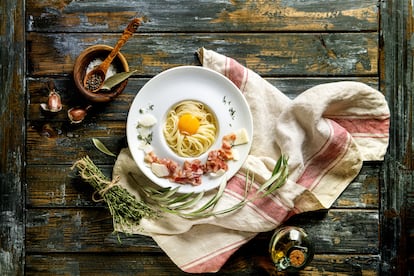Carbonara was invented by an American soldier and other Italian culinary heresies
A professor in Italy faces widespread criticism for doubting the authenticity of his country’s renowned recipes and products

Alberto Grandi has some powerful foes, including Alessandra Mussolini, a member of the European Parliament and granddaughter of Il Duce, the infamous dictator. She criticized the scholar from Lombardy (northern Italy) for being inconsistent, frivolous and unpatriotic. Similarly, Matteo Salvini, Italy’s Deputy Prime Minister, called him an “intellectual hitman for people who are jealous of Italy’s culinary excellence.” Ettore Prandini, president of the influential Coldiretti farmers’ association, dismissed Grandi’s “surreal attacks on national culinary tradition.” Grandi, an economics professor at the University of Parma in northern Italy, and a food history expert, says that his alleged provocations are based on years of research and are not an elaborate conspiracy to denigrate Italian products.
It all started with balsamic vinegar from Modena (northern Italy). Grandi found that the “black gold” from Reggio Emilia wasn’t a product with a reliably designated origin, but rather a dressing that had been used in Western Europe since the modern age began. Centuries ago, traders from Modena simply gave it a local label and began exporting it at an affordable price.
In 2018, Grandi wrote a controversial essay titled “Denominazioni di origine inventata,” (or “Product of invented origin”) in which he said that authentic Parmesan cheese, first crafted by the Benedictine monks from the Parma abbey, is only made today in the U.S. state of Wisconsin. The Parmesan cheese sold now is nothing more than a “recently created substitute.” He wrote that the Pachino tomato, the pride of Sicily, “is a hybrid produced in laboratories by an Israeli seed multinational.” And Marsala wine was “created, produced and widely marketed by an English merchant who added extra alcohol for better preservation during long voyages.” Grandi continued his quest of myth debunking and discovered that both panettone and tiramisu are “hybrid products” influenced by foreign cultures that were introduced to the Italian recipe book in the 20th century. He even argues that pizza mostly originated in the United States in the 1940s.
However, his most contentious claim is that pasta carbonara is a culinary fusion invented by an American soldier who fought in Italy during World War II. Grandi claims to have irrefutable evidence that “the recipe was first published in Chicago in 1952,” at least a year before this dish began appearing in Italian restaurants.
Mari Giusti, the Financial Times correspondent in Italy, recently wrote an article about Grandi’s work and his unique approach to culinary archaeology. The headline highlighted his claims about the foreign heritage of carbonara and “authentic” Parmesan cheese. Salvini promptly responded by saying it was an attack on the Italian food sector, an industry that contributes nearly 24% of the country’s GDP, orchestrated by the British press and a local collaborator. Grandi ascribes this criticism to the “unfortunate gastronationalism” displayed by Salvini and the nation at large, which “seeks to define its identity through food and soccer.” Those who claim that Italian popular cuisine has been exceptional “since the Roman Empire” are either practicing selective blindness or simply don’t know what they are talking about. As Antonio Gramsci, the Italian communist leader imprisoned by Mussolini’s fascist regime, once wrote from his cell, “History teaches, but it has no pupils.”
Sign up for our weekly newsletter to get more English-language news coverage from EL PAÍS USA Edition
Tu suscripción se está usando en otro dispositivo
¿Quieres añadir otro usuario a tu suscripción?
Si continúas leyendo en este dispositivo, no se podrá leer en el otro.
FlechaTu suscripción se está usando en otro dispositivo y solo puedes acceder a EL PAÍS desde un dispositivo a la vez.
Si quieres compartir tu cuenta, cambia tu suscripción a la modalidad Premium, así podrás añadir otro usuario. Cada uno accederá con su propia cuenta de email, lo que os permitirá personalizar vuestra experiencia en EL PAÍS.
¿Tienes una suscripción de empresa? Accede aquí para contratar más cuentas.
En el caso de no saber quién está usando tu cuenta, te recomendamos cambiar tu contraseña aquí.
Si decides continuar compartiendo tu cuenta, este mensaje se mostrará en tu dispositivo y en el de la otra persona que está usando tu cuenta de forma indefinida, afectando a tu experiencia de lectura. Puedes consultar aquí los términos y condiciones de la suscripción digital.









































